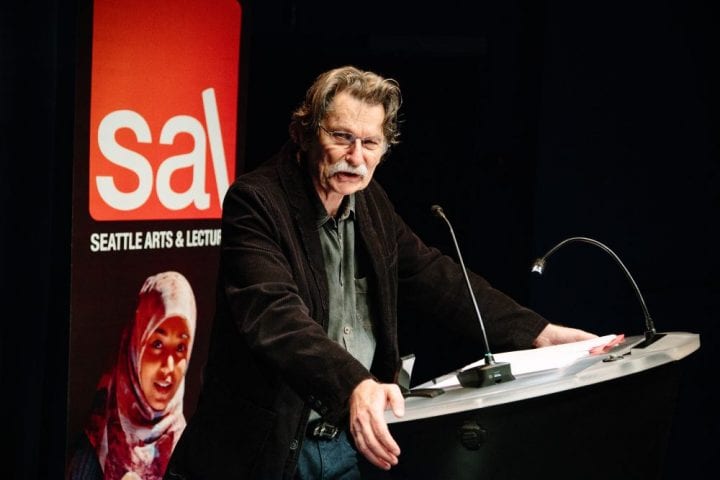
Introductions: Gregory Orr
February 14, 2018
On February 7 at McCaw Hall, Gregory Orr—master of the personal lyric poem, and one of our greatest advocates for how the reading and writing of poetry can help us heal and live more fully—read from his three collections: Concerning the Book that Is the Body of the Beloved, How Beautiful the Beloved, and River Inside the River. SAL Associate Director Rebecca Hoogs introduced and interviewed Gregory for this event, which was part of SAL’s 2017/18 Poetry Series.
By Rebecca Hoogs, SAL Associate Director
When I was a kid in Massachusetts, the highlight of my summer was a camping trip to Cape Cod with our church group. And each summer, we’d conclude the week with a potluck dinner on the beach at sunset. And as the sun approached the horizon, the group would start chanting: going, going, going. But we did so almost too early, so that we sometimes ended up chanting going, going, going for a couple of minutes as if the gone was imminent. It was almost a relief when the sun finally balanced on the horizon like water held by surface tension on the top of a glass, and then slipped below. When we could finally stop saying going and just say gone.
This memory came to me as I read Gregory Orr’s poetry. As I admired the way that his poetry felt as elemental as that beach, that sand, the repetition of the sun going down though it never actually goes down, we just perceive it as having left us. Just as there are no actual edges to the earth, Orr’s poetry examines the perceived edges and fuzzier non-edges of life, death, the body, and the soul, the before, the after. He examines what our childhoods made us into and what we make of it. The speaker in one poem declares, “I’m a ghost and gristle both.” Orr’s work walks through the physical world, drifts through the metaphysical world. His poems dream, they wake. They shake the dice bones of the body. They explore our collective mythology, our personal mythology. The conscious and the unconscious greet each other like old friends and then transcend their greeting.
Naomi Shihab Nye wrote that his poems “have always had the stunning ability to place mindfulness almost instantly back inside the mind. Once again, a river inhabits its true banks, and a soul, its boundless person.” Like Blake, like Whitman, there is a higher order to the work, to the mind at work in these poems.
In life, in poetry: time passes. Terrible things happen. Beauty happens too. Gregory Orr has made a life of being present in this life, his life, and has made order out of the disorder by firing it in the kiln of the lyric poem. These are poems we are lucky to hold in our hands, to put to the threshold of our lips. We bring their contents into our bodies. Please join me in welcoming their maker, the poet Gregory Orr.